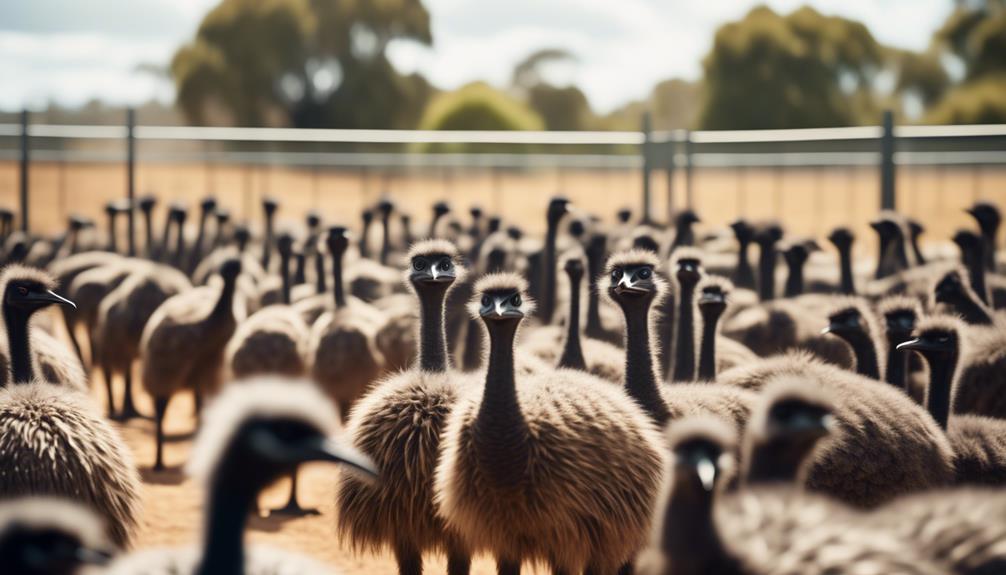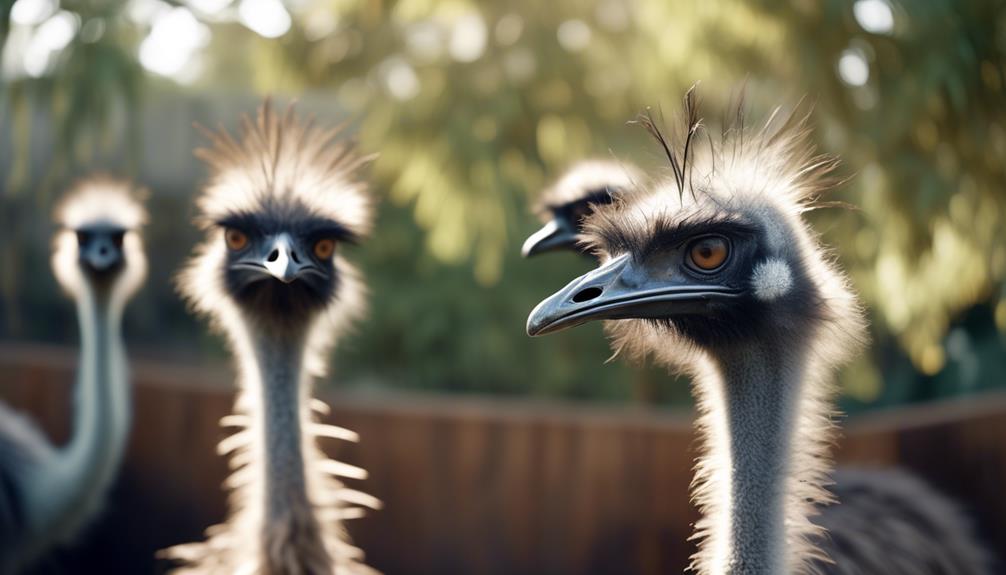
Have you ever wondered about the ethical implications of keeping emus in captivity? It is a topic that requires careful consideration, as it raises questions about conservation efforts, animal welfare, and the impact of confinement on the behavior and health of these majestic creatures.
As you explore this complex issue, you will discover the various perspectives surrounding emu captivity and the potential alternatives to traditional practices. But first, let us delve into the rise in emu captivity and the need to strike a delicate balance between preservation and ethical treatment.
Key Takeaways
- Emu captivity should prioritize animal rights and welfare, considering the ethical concerns of confinement.
- Efforts should be made to minimize the environmental impact and ecological footprint of emu captivity.
- Emu enrichment, socialization, proper nutrition, and adequate space are essential for their overall welfare in captive environments.
- Small enclosures and limited access to veterinary care can have negative implications for emu behavior and health, emphasizing the importance of behavioral enrichment and regular veterinary care.
The Rise in Emu Captivity

The increasing trend of keeping emus in captivity has gained significant attention in recent years. Emu breeding and commercial emu farming have become popular practices, as more people recognize the potential benefits of these majestic birds. Emu breeding allows for the production of emus for various purposes, such as meat, oil, feathers, and even tourism. Commercial emu farming, on the other hand, focuses on large-scale operations that aim to meet the growing demand for emu products.
Emu breeding programs often prioritize the health and welfare of the birds, ensuring proper nutrition, adequate space, and appropriate socialization. These programs aim to maintain genetic diversity and improve the overall quality of the emu population. Additionally, they contribute to the conservation efforts of these magnificent creatures. Commercial emu farming, while primarily driven by profit, also requires responsible management to ensure the well-being of the emus and the sustainability of the industry.
As with any industry involving animals, there are challenges that come with emu breeding and commercial emu farming. It's crucial to address concerns regarding ethics, animal welfare, and environmental impact. By promoting transparency, education, and responsible practices, the rise in emu captivity can be accompanied by ethical considerations that prioritize the health and happiness of these remarkable birds.
Balancing Conservation and Captivity
With the growing popularity of emu breeding and commercial emu farming, it's essential to strike a delicate balance between conservation efforts and the needs of emus in captivity. On one hand, keeping emus in captivity can contribute to the conservation of the species by providing a controlled environment for breeding and protecting them from threats in the wild. This can help prevent their population from declining further and even aid in their recovery. However, it's crucial to ensure that the rights and welfare of emus are respected in captivity.
Animal rights should be a priority when considering emus in captivity. They're sentient beings with physical and emotional needs that must be met. It's important to provide them with appropriate housing, nutrition, and social interactions to ensure their well-being. Additionally, emus should be protected from any form of abuse or exploitation.
Furthermore, the environmental impact of emu captivity should be carefully examined. The space and resources required to keep emus in captivity can be significant. It's important to assess the sustainability of such practices and ensure that they don't harm the natural environment or contribute to habitat destruction. Efforts should be made to minimize the ecological footprint and ensure that emu captivity doesn't have adverse effects on other species or ecosystems.
Emu Welfare in Captive Environments

To ensure the well-being of emus in captivity, it's important to prioritize their welfare by addressing their physical and emotional needs. Emus are intelligent and curious creatures, and providing them with enrichment activities is crucial to their overall happiness. Here are four ways in which we can promote emu welfare in captive environments:
- Emu enrichment: Emus thrive when they've opportunities to engage in natural behaviors, such as foraging and exploring their surroundings. Providing them with objects to peck at, puzzles to solve, and different textures to interact with can keep them mentally stimulated.
- Emu socialization: Emus are social animals and benefit from social interactions with their own kind. Pairing emus together allows them to establish social hierarchies and engage in natural behaviors like grooming and nest-building. It's important to ensure that emus are housed with compatible individuals to prevent aggression or stress.
- Proper nutrition: Emus have specific dietary requirements, and it's essential to provide them with a balanced diet that includes a variety of fruits, vegetables, grains, and protein sources. Regular monitoring of their weight and health is necessary to ensure their nutritional needs are being met.
- Adequate space: Emus are large birds that require ample space to move around freely. Providing them with spacious enclosures or access to large outdoor areas allows them to engage in natural behaviors, exercise, and maintain good physical health.
Ethical Concerns of Confinement
When considering the well-being of emus in captivity, it's important to address the ethical concerns surrounding their confinement. Animal rights activists argue that all animals, including emus, have the right to live freely in their natural habitats. Confining them to small enclosures restricts their natural behaviors and limits their ability to thrive. Emus are social animals, and being isolated can have a detrimental psychological impact on them. Lack of social interaction and limited space can lead to stress, anxiety, and even depression.
Emus are known for their large size and long legs, which enable them to roam and run freely in the wild. In captivity, however, they're often confined to small enclosures, which restrict their movement and natural behaviors. This confinement can cause physical discomfort and lead to the development of health issues such as obesity and muscle atrophy.
Moreover, the psychological impact of confinement on emus shouldn't be underestimated. Emus are highly intelligent animals that require mental stimulation and social interaction. When kept in small enclosures, they may become bored, frustrated, and exhibit abnormal behaviors such as pacing or self-harm. This can greatly impact their overall well-being and quality of life.
Implications for Emu Behavior and Health

The confinement of emus in small enclosures has significant implications for their behavior and health. When emus are kept in inadequate spaces, their natural behaviors and instincts can be severely restricted, leading to various behavioral issues. Additionally, their health may suffer due to the lack of space to move around and engage in natural behaviors.
Here are some specific implications for emu behavior and health in captivity:
- Limited exercise opportunities: Small enclosures restrict emus' ability to roam and explore their environment, leading to decreased physical activity and potential weight gain.
- Increased stress levels: Emus are naturally curious and social animals. When confined to small spaces, they may experience heightened stress levels due to the lack of mental stimulation and social interaction.
- Behavioral abnormalities: Emus in captivity may exhibit abnormal behaviors such as pacing, feather plucking, or self-harm as a result of boredom, frustration, or stress.
- Reduced access to veterinary care: In small enclosures, it can be challenging for caretakers to provide necessary veterinary care, such as routine check-ups, vaccinations, and medical treatments, which can impact the overall health and well-being of emus.
To address these implications, it's crucial to prioritize behavioral enrichment for emus in captivity, providing them with opportunities for physical exercise, mental stimulation, and social interaction. Additionally, regular veterinary care should be ensured to monitor and maintain the health of captive emus.
Alternatives to Traditional Captivity Practices
Considering the implications of keeping emus in small enclosures, it is important to explore alternative practices that can better accommodate their natural behaviors and promote their overall well-being. One such alternative is the creation of sustainable environments that mimic the emus' natural habitat. These environments can provide the necessary space for emus to roam, forage, and exhibit their natural behaviors.
Emu rehabilitation centers are one example of a sustainable alternative to traditional captivity practices. These centers focus on rehabilitating emus that have been injured or orphaned, with the ultimate goal of releasing them back into the wild. By providing emus with larger enclosures, access to natural vegetation, and opportunities for social interaction, rehabilitation centers aim to restore their physical and mental health.
To give you a better understanding of the alternatives to traditional captivity practices, here is a table that compares the features of traditional captivity and sustainable environments:
| Traditional Captivity | Sustainable Environments |
|---|---|
| Small enclosures | Larger enclosures |
| Limited movement | Ample space for roaming |
| Artificial diet | Access to natural vegetation |
| Limited social interaction | Opportunities for social interaction |
Frequently Asked Questions
Are Emus Commonly Kept as Pets?
Emus can be kept as exotic pets, but it's important to consider the ethical implications. Some people find them to be great therapy animals, while others argue that they should be left in their natural habitats.
How Do Emus Behave in the Wild?
In the wild, emus have fascinating mating rituals and exhibit territorial behavior. They engage in elaborate courtship displays and establish their own territories. Understanding their natural behaviors can help us make informed decisions about their captivity.
What Are the Economic Benefits of Keeping Emus in Captivity?
Keeping emus in captivity has economic benefits, as emu farming can be sustainable and profitable. It provides opportunities for employment, local businesses, and the production of emu-related products, contributing to the local economy.
Can Emus Be Successfully Reintroduced Into the Wild After Captivity?
Successfully reintroducing emus into the wild after captivity presents challenges. While some individuals may adapt, others struggle due to the loss of natural instincts. Empathy and thorough understanding of their needs are crucial for reintroduction success.
How Do Emus Adapt to Captivity Compared to Other Bird Species?
Emus adapt to captivity differently than other bird species. They can adjust to the captive environment, but it's important to consider their response to captivity and their overall adaptability when discussing their ethical considerations.
Conclusion
In conclusion, the ethical considerations surrounding the captivity of emus are complex and require careful consideration. As we weigh the balance between conservation and captivity, we must prioritize the welfare of these unique creatures.
Confinement raises valid ethical concerns, impacting both emu behavior and health. It's crucial that we explore alternatives to traditional captivity practices, ensuring that emus are given the opportunity to thrive in environments that respect their natural instincts and promote their well-being.
Our actions today will shape the future of emu conservation and the preservation of their species.




